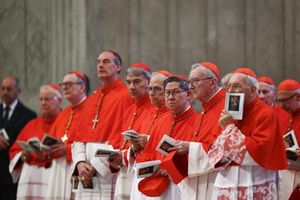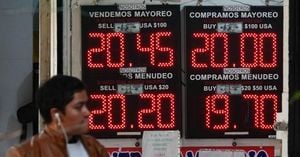In a significant move to bolster European security, French President Emmanuel Macron and Germany's newly appointed Chancellor Friedrich Merz announced the establishment of a joint security council during Merz's first diplomatic visit to Paris on May 7, 2025. This initiative aims to enhance defense cooperation between the two nations amid escalating geopolitical tensions, particularly in light of Russia's ongoing war against Ukraine.
Macron, addressing the media at a joint press conference, articulated the purpose of the new council, stating, "We will set up a French-German defence and security council to meet regularly to bring operational responses to our common strategic challenges." This statement underscores the urgency of the situation, as Europe grapples with uncertainties regarding security commitments from the United States.
Friedrich Merz, who took office just a day prior, on May 6, 2025, is recognized for his pro-European stance and commitment to restoring Germany's role on the global stage. He emphasized the necessity for joint measures to strengthen Europe’s defense capabilities, remarking, "We will take joint measures to further enhance Europe's security and defence capabilities." This collaboration comes at a time when France and Britain are spearheading discussions among a coalition of 30 countries regarding the potential deployment of troops to secure any ceasefire in Ukraine.
The Franco-German partnership, historically the cornerstone of the European Union, has experienced strains in recent years, particularly with disagreements over defense policies and energy strategies. The 1963 Élysée Treaty, which symbolized the reconciliation between France and Germany after two world wars, laid the groundwork for a robust alliance that has shaped the political, economic, and security landscape of Europe. However, recent actions, such as Berlin’s unilateral €200 billion energy relief package, have tested this longstanding relationship.
Despite these challenges, the new leadership under Merz is expected to revitalize Franco-German ties. Both leaders share a vision of a more autonomous Europe that is less reliant on the United States, especially as the global political climate continues to shift. The 2019 Aachen Treaty had already deepened cooperation in various sectors, including innovation, energy transition, and cultural exchange, setting a precedent for further collaboration.
Merz's commitment to working closely with France and Britain on defense matters is particularly crucial given the current geopolitical climate. He stated his intention to consult intensively with both nations, suggesting that including Poland in these discussions would enhance their collective security efforts. As Europe faces mounting pressures, the success of the Franco-German partnership will significantly influence the EU's ability to maintain stability and promote economic growth across the continent.
Analysts note that the revitalization of this partnership is not just a matter of political expediency but a strategic necessity. The ongoing conflict in Ukraine has highlighted vulnerabilities within European security frameworks, prompting calls for a more unified and robust defense posture. The establishment of the French-German defense and security council is seen as a proactive step towards addressing these challenges.
The Franco-German axis has historically played a vital role in driving European integration and fostering common markets. The collaboration between these two nations is essential for advancing collective European defense initiatives and ensuring political cohesion within the EU. As Macron and Merz embark on this new chapter of cooperation, the eyes of Europe will be on their ability to navigate the complexities of modern geopolitics.
In conclusion, the establishment of a joint security council between France and Germany marks a pivotal moment in European defense strategy. As both nations work to strengthen their ties and respond to shared challenges, their collaboration will be instrumental in shaping the future of European security and stability.



